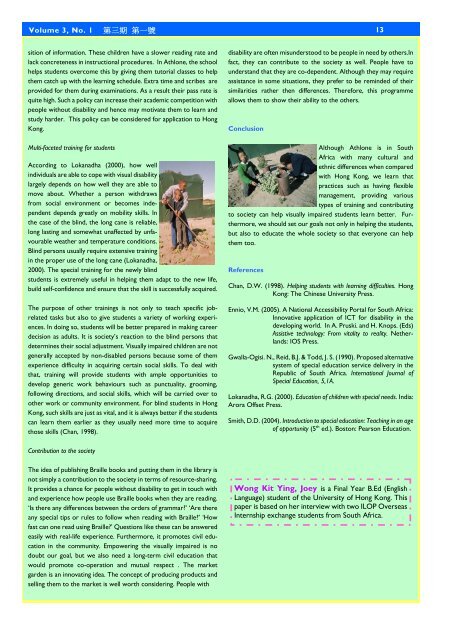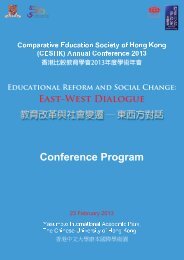Issue No.5 - Faculty of Education - The University of Hong Kong
Issue No.5 - Faculty of Education - The University of Hong Kong
Issue No.5 - Faculty of Education - The University of Hong Kong
You also want an ePaper? Increase the reach of your titles
YUMPU automatically turns print PDFs into web optimized ePapers that Google loves.
Volume 3, No. 1 第三期 第一號 13<br />
sition <strong>of</strong> information. <strong>The</strong>se children have a slower reading rate and<br />
lack concreteness in instructional procedures. In Athlone, the school<br />
helps students overcome this by giving them tutorial classes to help<br />
them catch up with the learning schedule. Extra time and scribes are<br />
provided for them during examinations. As a result their pass rate is<br />
quite high. Such a policy can increase their academic competition with<br />
people without disability and hence may motivate them to learn and<br />
study harder. This policy can be considered for application to <strong>Hong</strong><br />
<strong>Kong</strong>.<br />
Multi-faceted training for students<br />
According to Lokanadha (2000), how well<br />
individuals are able to cope with visual disability<br />
largely depends on how well they are able to<br />
move about. Whether a person withdraws<br />
from social environment or becomes independent<br />
depends greatly on mobility skills. In<br />
the case <strong>of</strong> the blind, the long cane is reliable,<br />
long lasting and somewhat unaffected by unfavourable<br />
weather and temperature conditions.<br />
Blind persons usually require extensive training<br />
in the proper use <strong>of</strong> the long cane (Lokanadha,<br />
2000). <strong>The</strong> special training for the newly blind<br />
students is extremely useful in helping them adapt to the new life,<br />
build self-confidence and ensure that the skill is successfully acquired.<br />
<strong>The</strong> purpose <strong>of</strong> other trainings is not only to teach specific jobrelated<br />
tasks but also to give students a variety <strong>of</strong> working experiences.<br />
In doing so, students will be better prepared in making career<br />
decision as adults. It is society’s reaction to the blind persons that<br />
determines their social adjustment. Visually impaired children are not<br />
generally accepted by non-disabled persons because some <strong>of</strong> them<br />
experience difficulty in acquiring certain social skills. To deal with<br />
that, training will provide students with ample opportunities to<br />
develop generic work behaviours such as punctuality, grooming,<br />
following directions, and social skills, which will be carried over to<br />
other work or community environment. For blind students in <strong>Hong</strong><br />
<strong>Kong</strong>, such skills are just as vital, and it is always better if the students<br />
can learn them earlier as they usually need more time to acquire<br />
those skills (Chan, 1998).<br />
Contribution to the society<br />
<strong>The</strong> idea <strong>of</strong> publishing Braille books and putting them in the library is<br />
not simply a contribution to the society in terms <strong>of</strong> resource-sharing.<br />
It provides a chance for people without disability to get in touch with<br />
and experience how people use Braille books when they are reading.<br />
‘Is there any differences between the orders <strong>of</strong> grammar?’ ‘Are there<br />
any special tips or rules to follow when reading with Braille?’ ‘How<br />
fast can one read using Braille?’ Questions like these can be answered<br />
easily with real-life experience. Furthermore, it promotes civil education<br />
in the community. Empowering the visually impaired is no<br />
doubt our goal, but we also need a long-term civil education that<br />
would promote co-operation and mutual respect . <strong>The</strong> market<br />
garden is an innovating idea. <strong>The</strong> concept <strong>of</strong> producing products and<br />
selling them to the market is well worth considering. People with<br />
disability are <strong>of</strong>ten misunderstood to be people in need by others.In<br />
fact, they can contribute to the society as well. People have to<br />
understand that they are co-dependent. Although they may require<br />
assistance in some situations, they prefer to be reminded <strong>of</strong> their<br />
similarities rather then differences. <strong>The</strong>refore, this programme<br />
allows them to show their ability to the others.<br />
Conclusion<br />
Although Athlone is in South<br />
Africa with many cultural and<br />
ethnic differences when compared<br />
with <strong>Hong</strong> <strong>Kong</strong>, we learn that<br />
practices such as having flexible<br />
management, providing various<br />
types <strong>of</strong> training and contributing<br />
to society can help visually impaired students learn better. Furthermore,<br />
we should set our goals not only in helping the students,<br />
but also to educate the whole society so that everyone can help<br />
them too.<br />
References<br />
Chan, D.W. (1998). Helping students with learning difficulties. <strong>Hong</strong><br />
<strong>Kong</strong>: <strong>The</strong> Chinese <strong>University</strong> Press.<br />
Ennio, V.M. (2005). A National Accessibility Portal for South Africa:<br />
Innovative application <strong>of</strong> ICT for disability in the<br />
developing world. In A. Pruski. and H. Knops. (Eds)<br />
Assistive technology: From vitality to reality. Netherlands:<br />
IOS Press.<br />
Gwalla-Ogisi. N., Reid, B.J. & Todd, J. S. (1990). Proposed alternative<br />
system <strong>of</strong> special education service delivery in the<br />
Republic <strong>of</strong> South Africa. International Journal <strong>of</strong><br />
Special <strong>Education</strong>, 5,1A.<br />
Lokanadha, R.G. (2000). <strong>Education</strong> <strong>of</strong> children with special needs. India:<br />
Arora Offset Press.<br />
Smith, D.D. (2004). Introduction to special education: Teaching in an age<br />
<strong>of</strong> opportunity (5 th ed.). Boston: Pearson <strong>Education</strong>.<br />
Wong Kit Ying, Joey is a Final Year B.Ed (English<br />
Language) student <strong>of</strong> the <strong>University</strong> <strong>of</strong> <strong>Hong</strong> <strong>Kong</strong>. This<br />
paper is based on her interview with two ILOP Overseas<br />
Internship exchange students from South Africa.
















